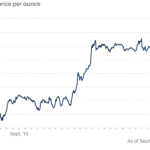In recent months, Bitcoin’s price rally has faltered, with the cryptocurrency failing to gain momentum in 2025, ultimately remaining near the $110,000 mark it achieved in December. This stagnation comes at a time when Bitcoin and cryptocurrencies have seen significant institutional support, particularly from Wall Street and notable figures in the financial world.
Elon Musk, the billionaire CEO of Tesla, has issued a stark warning tied to a potential $37 trillion challenge to gold, raising concerns about the future stability of Bitcoin. The situation has been compounded by the challenges faced by Nakamoto, a bitcoin treasury company led by David Bailey, which has experienced a staggering 50% drop in its share price. This decline has prompted fears of a possible “death spiral” for Bitcoin’s price.
Nakamoto was established earlier this year, with aspirations to emulate the successful strategies of other prominent Bitcoin investors. However, after merging with healthcare company Kindly MD in August and acquiring nearly 6,000 bitcoins at a substantial cost, the company’s valuation has taken a considerable hit. Since reaching its peak in May, Nakamoto’s stock has plummeted by 95%, reducing its value significantly. The company’s market capitalization has fallen to a multiple-to-net asset value (mNAV) of just 0.7, indicating it is now trading below the value of its held bitcoins, as per data from BitcoinTreasuries.net.
The mNAV metric is particularly telling, with a value of 1 indicating that a company’s market capitalization is equal to its underlying assets. Nakamoto’s substantial decline is concerning, especially compared to its apparent growth potential when it traded at more than 20 times the value of its bitcoin assets.
Concerns regarding the sustainability of Bitcoin’s price have been echoed by venture capital firm Breed, which warned of a “death spiral” if companies struggle to maintain mNAVs above 1 and are forced to liquidate their assets. Such actions could exacerbate negative market pressures, particularly for newer treasury firms lacking the backing and scale of established players like Strategy, which has successfully navigated the market since 2020 while amassing a significant bitcoin portfolio of 638,000 coins.
David Bailey has sought to alleviate anxiety surrounding Nakamoto’s financial health, stating the importance of building an “aligned shareholder base” and encouraging shareholders to exit if they entered purely for trading purposes. He has also pointed finger at the influx of new crypto treasury companies flooding the market, claiming that the narrative around the sector has become muddled due to “toxic financing” and a lack of clear strategic vision among many of these emerging enterprises.
As market conditions evolve, the future of Bitcoin—and companies involved in its treasury management—remains uncertain, imparting caution among investors and stakeholders in the cryptocurrency landscape.







